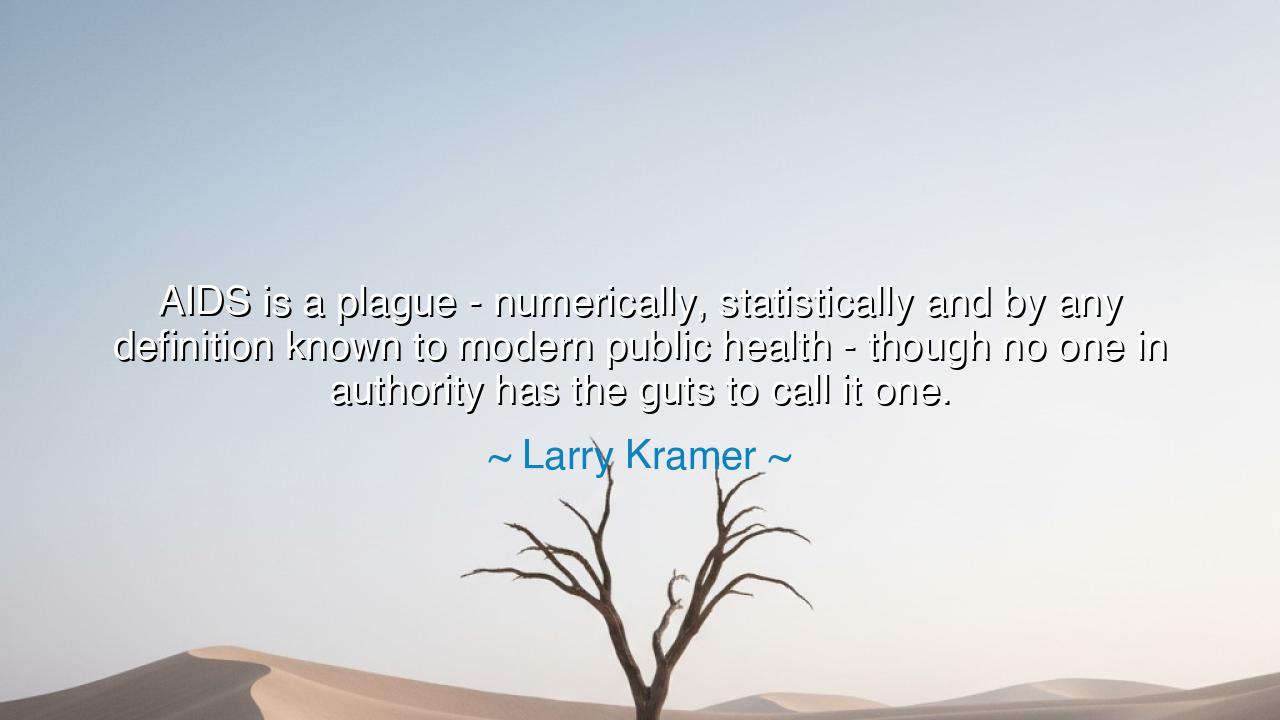
AIDS is a plague - numerically, statistically and by any
AIDS is a plague - numerically, statistically and by any definition known to modern public health - though no one in authority has the guts to call it one.






In the storm-torn years of the late twentieth century, when silence was more deadly than disease, the voice of Larry Kramer rose like thunder from the wilderness. He declared, “AIDS is a plague—numerically, statistically, and by any definition known to modern public health—though no one in authority has the guts to call it one.” These were not words of diplomacy but of defiance, not crafted for comfort but for awakening. Kramer, prophet of a forgotten people, spoke these words when truth itself had been buried under fear, prejudice, and indifference. His cry was a call to conscience—a demand that the world name what it feared to see.
To understand his words, one must see the world as it was then. The AIDS crisis, rising in the 1980s, swept through communities like a biblical fire. Thousands fell ill, and thousands more died—men and women, the young, the beautiful, the hopeful—struck down by a disease that society refused to acknowledge. Governments hesitated. Churches remained silent. The press whispered. To speak of AIDS was to confront the darkness of stigma and the hypocrisy of power. And so, the truth that it was indeed a plague—a scourge of humanity—was buried beneath cowardice. Kramer’s fury was the fury of one who watched his people perish while the powerful looked away.
In the ancient world, plagues were not only diseases but judgments upon the moral order of society. When pestilence struck, the people asked, “What have we neglected? Whose cries have we ignored?” Larry Kramer, in calling AIDS a plague, was not merely naming a medical reality; he was declaring a moral reckoning. He was saying that the illness was not only in the body but in the soul of civilization itself—that indifference, prejudice, and apathy had become their own contagions. His words echoed the prophets of old, who stood before kings and said, “You have sinned by your silence.”
There is a story from that time—of a man named Ryan White, a young boy infected through a blood transfusion. Cast out by his school, shunned by his neighbors, he became the face of innocence amid hysteria. It was through his suffering that America began to see that AIDS was not a punishment but a tragedy, not divine wrath but human neglect. His courage, like Kramer’s rage, forced a sleeping nation to awaken. For it is often the innocent who bear the cost of the world’s fear, and only truth, spoken boldly, can begin the healing.
Kramer’s words were not gentle because the times did not deserve gentleness. He believed that to name the truth was an act of salvation, and that euphemisms were the handmaidens of death. When officials refused to call AIDS a plague, they denied its gravity. When they refused to say “crisis,” they delayed compassion. Kramer, like a warrior of conscience, wielded his words as weapons. His anger was love in its fiercest form—the love that refuses to let the world forget its duty to the suffering.
The lesson of his cry is eternal: when truth is feared, honesty becomes a revolution. To face suffering with clear eyes is not cruelty—it is courage. Just as a healer cannot cure what he will not name, a society cannot mend what it refuses to see. The moral disease of denial is often worse than the physical affliction, for it spreads through generations, teaching them to look away from pain rather than to confront it with compassion.
Let those who live in quieter times remember the fire of that age. Do not wait for calamity to teach you empathy. Do not hide behind polite words when the world bleeds. Speak the truth boldly, even when it burns the tongue. If injustice is a plague, then courage is the medicine. If silence kills, then speech—honest, raw, unyielding—is the cure.
And so, the wisdom endures: to name what is broken is the first step toward healing. Whether in the realm of medicine, justice, or the human heart, we must not shrink from truth. Let the example of Larry Kramer remind us that one voice, filled with righteous fury, can pierce the fog of denial and awaken a world to its conscience. For the cost of silence is death, but the reward of truth is life—and in that truth, humanity finds its redemption.






AAdministratorAdministrator
Welcome, honored guests. Please leave a comment, we will respond soon